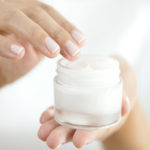Aspirin is a popular over-the-counter fever-reducing and anti-inflammatory drug that you can easily purchase at any pharmacy, and the price of these tablets is quite affordable. Aspirin contains acetylsalicylic acid as the active ingredient and is commonly used to relieve pain, reduce fever, fight inflammation, and inhibit platelet aggregation.
The reason why aspirin can whiten the skin and reduce acne is due to its components containing acetic acid and salicylic acid, which have skin-improving properties. In skincare products, we often see ingredients such as acetic acid and salicylic acid. These substances help control oil, dry the surface, and effectively regulate sebum under the pores. Along with their anti-inflammatory and anti-acne properties, these components help soothe the skin and reduce acne quickly.

Aspirin has a pH level of around 7-8, while our skin has a slightly acidic pH of 4-5. The higher pH of aspirin when applied to the skin causes the dead skin cells to swell and exfoliate, stimulating the growth of new cells. Therefore, applying aspirin to the skin helps whiten it. However, you should not consume aspirin orally as it increases the risk of gastric bleeding. Applying aspirin topically also requires caution as the high pH can disrupt the skin’s balance.

Some ways to use aspirin
You can dissolve aspirin in clean water to create a paste-like mixture, then apply it to the skin and gently massage.
You can also mix 3 aspirin tablets with 1 tablespoon of oatmeal, 1 tablespoon of fresh milk, blend well, and then apply this mixture to your face. Leave it on for about 30 minutes, then rinse with water.

After using aspirin, it is recommended to use a pH-balancing toner to restore the skin’s pH level. You should use aspirin 3-4 times a week and avoid excessive use as it can harm the skin. After whitening the skin with aspirin, you should also take precautions such as using a face mask, protective clothing, and sunscreen to protect the delicate new skin.
Just like any other medication or skincare product, aspirin should be used in appropriate doses to avoid undesirable side effects.





































